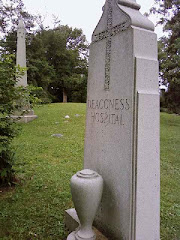
Existentialism can be defined as the life’s will to discover meaning for itself. It is why societies have cemeteries and people want to make their mark on the earth before they die. This idea can be seen in the characters of Peter S. Beagle’s, A Fine and Private Place. In the novel, there is a man who lives in a cemetery, a widowed wife who lives alone, and two ghosts with unfinished business. As it is a major theme in the novel, each of the characters can be defined by and contribute to the idea of existentialism.
The first character introduced in the novel, Jonathon Rebeck, supports the novel’s theme of existentialism through his struggle to find the meaning of his life. Mr. Rebeck was once a well-known pharmacist in Yorkchester, New York, who later loses his business and most of what he owns. In the result of his despair, Rebeck stumbles upon Yorkchester cemetery and decides to live there as a bum. As the years pass, Mr. Rebeck learns the entire layout of the cemetery and gains pleasure by helping the ghosts. Mr. Rebeck is defined by the idea of existentialism because even after losing everything, the cemetery becomes his meaning in life. This shows his drive to discover meaning despite being held back by society. Also, Mr. Rebeck enjoys helping the ghosts of the cemetery because it makes his life feel more significant. Because of this, Mr. Rebeck is a character in the novel that supports the theme of existentialism. He is also transformed at the end by leaving the cemetery and starting a new life. This signifies his will to make his mark on world and finally feel like a part of it. Overall, Mr. Rebeck is surely a character that contributes to the novel’s theme of existentialism.
Another character that contributes to the novel’s theme of existentialism is the widowed wife, Gertrude Klapper. In the novel, Mrs. Klapper struggles to find meaning after losing her beloved husband, Morris. One day, Mrs. Klapper visits Morris’ grave in Yorkchester cemetery and stumbles upon Mr. Rebeck. After talking to him a great deal, Mrs. Klapper later decides to visit Mr. Rebeck again. After multiple visits, Mrs. Klapper starts to develop a bond with Mr. Rebeck and feels a certain amount of closeness with him as she felt with Morris. There is no doubt that Morris gave Mrs. Klapper’s life meaning and although she loses this after his death, she regains it by caring for Mr. Rebeck. This signifies Mrs. Klapper’s drive towards existentialism because she feels that her life is necessary by acting as a caregiver to Mr. Rebeck like she did with her husband. At the end of the novel this transforms her as she is able to convince Mr. Rebeck to come out of the cemetery and live in the outside world. As a result, she no longer feels alone and unnecessary because she can take care of someone. Mrs. Klapper’s character supplies a significant contribution to the novel’s theme of existentialism.
The two ghosts in the novel, Michael Morgan and Laura Durand, also play an active role in supporting the theme of existentialism. Although they are dead, both have unfinished business from the time they were alive and do not rest until it is settled. Michael never knew what it was like to love, and Laura never felt loved enough. Throughout the novel, Michael and Laura establish a close relationship with each other by having conversations in the cemetery. They each exchange ideas and learn about each other, coming to the conclusion that something was missing while they were alive. They later come to find that it was love that was missing in their lives and this made them both feel empty and meaningless after death. By the end of the novel, they agree to love each other selflessly so that both are able to lay down for their eternal rest. This love between Michael and Laura indicates their will towards existentialism even after death. The love that they did not have in life made them feel unfulfilled so falling in love after death gave their entire life meaning. They are also transformed by this love, as Michael thought he could never love someone and Laura finally feels the full affection of another’s soul. Both Michael and Laura are characters that contribute to the novel’s theme of existentialism.
Each of the characters in A Fine and Private Place contributes to the novel’s theme of existentialism. This allows each of the characters to also become transformed in the cemetery as they drive themselves to discover the meaning of their lives. In many ways, the theme of this novel defines existentialism as intrinsic to the human spirit. Cemeteries are a part of society that maintain this idea, as gravestones are a person’s final mark on the earth. It allows for some resolution that a person lived and made a difference to the world. The theme of existentialism can therefore be seen in life and death and is defined by all the souls that contribute towards discovering the meaning of existence.
The first character introduced in the novel, Jonathon Rebeck, supports the novel’s theme of existentialism through his struggle to find the meaning of his life. Mr. Rebeck was once a well-known pharmacist in Yorkchester, New York, who later loses his business and most of what he owns. In the result of his despair, Rebeck stumbles upon Yorkchester cemetery and decides to live there as a bum. As the years pass, Mr. Rebeck learns the entire layout of the cemetery and gains pleasure by helping the ghosts. Mr. Rebeck is defined by the idea of existentialism because even after losing everything, the cemetery becomes his meaning in life. This shows his drive to discover meaning despite being held back by society. Also, Mr. Rebeck enjoys helping the ghosts of the cemetery because it makes his life feel more significant. Because of this, Mr. Rebeck is a character in the novel that supports the theme of existentialism. He is also transformed at the end by leaving the cemetery and starting a new life. This signifies his will to make his mark on world and finally feel like a part of it. Overall, Mr. Rebeck is surely a character that contributes to the novel’s theme of existentialism.
Another character that contributes to the novel’s theme of existentialism is the widowed wife, Gertrude Klapper. In the novel, Mrs. Klapper struggles to find meaning after losing her beloved husband, Morris. One day, Mrs. Klapper visits Morris’ grave in Yorkchester cemetery and stumbles upon Mr. Rebeck. After talking to him a great deal, Mrs. Klapper later decides to visit Mr. Rebeck again. After multiple visits, Mrs. Klapper starts to develop a bond with Mr. Rebeck and feels a certain amount of closeness with him as she felt with Morris. There is no doubt that Morris gave Mrs. Klapper’s life meaning and although she loses this after his death, she regains it by caring for Mr. Rebeck. This signifies Mrs. Klapper’s drive towards existentialism because she feels that her life is necessary by acting as a caregiver to Mr. Rebeck like she did with her husband. At the end of the novel this transforms her as she is able to convince Mr. Rebeck to come out of the cemetery and live in the outside world. As a result, she no longer feels alone and unnecessary because she can take care of someone. Mrs. Klapper’s character supplies a significant contribution to the novel’s theme of existentialism.
The two ghosts in the novel, Michael Morgan and Laura Durand, also play an active role in supporting the theme of existentialism. Although they are dead, both have unfinished business from the time they were alive and do not rest until it is settled. Michael never knew what it was like to love, and Laura never felt loved enough. Throughout the novel, Michael and Laura establish a close relationship with each other by having conversations in the cemetery. They each exchange ideas and learn about each other, coming to the conclusion that something was missing while they were alive. They later come to find that it was love that was missing in their lives and this made them both feel empty and meaningless after death. By the end of the novel, they agree to love each other selflessly so that both are able to lay down for their eternal rest. This love between Michael and Laura indicates their will towards existentialism even after death. The love that they did not have in life made them feel unfulfilled so falling in love after death gave their entire life meaning. They are also transformed by this love, as Michael thought he could never love someone and Laura finally feels the full affection of another’s soul. Both Michael and Laura are characters that contribute to the novel’s theme of existentialism.
Each of the characters in A Fine and Private Place contributes to the novel’s theme of existentialism. This allows each of the characters to also become transformed in the cemetery as they drive themselves to discover the meaning of their lives. In many ways, the theme of this novel defines existentialism as intrinsic to the human spirit. Cemeteries are a part of society that maintain this idea, as gravestones are a person’s final mark on the earth. It allows for some resolution that a person lived and made a difference to the world. The theme of existentialism can therefore be seen in life and death and is defined by all the souls that contribute towards discovering the meaning of existence.
















Finding our life's meaning in the cemetery or after death seem to negate life itself, but perhaps it is a reminder that many of us drift through our life without purpose or any attempt to find meaning.
ReplyDelete